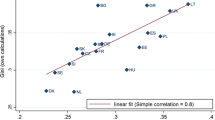Abstract
Olivera, in “Changes in Inequality and Generalized Trust in Europe” argues that the relationship between economic inequality and generalized trust becomes insignificant in his time series analyses when regression fixed effects are added to a basic model . I argue that the rationale for his analyses is problematic since neither trust nor inequality change much over time, that he includes former Communist nations inappropriately, and that a full model of trust and inequality must include countries outside Europe.


Similar content being viewed by others
References
Bauer, P. C. (2014). Negative experiences and trust: a causal analysis of the effects of victimization on generalized trust. European Sociological Review, 2014, 1–21.
Becker, L. C. (1996). Trust as noncognitive security about motives. Ethics, 107, 43–61.
Giddens, A. (1991). Modernity and Self-identity. Camebridge: Polity Press.
Heckman, J. J. (1979). Sample selection bias as a specification error. Econometrica, 47(1), 153–161.
Hooghe, M., & Reeskens, T. (2008). Cross-cultural measurement equivalence of generalized trust. Evidence from the European Social Survey (2002 and 2004). Social Indicators Research, 85(3), 515–532.
Jones, K. (1996). Trust as an affective attitude. Ethics, 107, 4–25.
Muller, D., Torgler, B., & Uslaner, E. M. (2012). A comment on ‘inherited trust and growth’. Economics Bulletin, 32(2012), 1481–1488.
Plümper, T., Troeger, V. E., & Manow, P. (2005). Panel data analysis in comparative politics: Linking method to theory. European Journal of Political Research, 44, 327–354.
Uslaner, E. M. (2002). The moral foundations of trust. New York: Cambridge University Press.
Uslaner, E. M. (2008). Corruption, inequality, and the rule of law. New York: Cambridge University Press.
Uslaner, E. M., & Brown, M. (2005). Inequality, trust, and civic engagement. American Politics Research, 31(4), 868–894.
Wrightsman, L. S. (1991). Interpersonal trust and attitudes toward human nature. In J. Robinson et al. (Eds.), Measures of personality and psychological attitudes. San Diego: Academic Press.
Author information
Authors and Affiliations
Corresponding author
Appendix
Appendix
As many others do–he cites Hooghe and Reeskens (2008)–Olivera’s measure of trust includes not only the generalized trust question (“Generally speaking, do you believe that most people can be trusted or can’t you be too careful in dealing with people?”) but also measures of fairness and helpfulness.. Olivera, as many others do, call this composite index “trust.” Yet, trust, helpfulness, and fairness are not the same thing. In the American General Social Survey from 1972 to 2010, the three measures do not scale well. A factor analysis gives a seeming one-dimensional solution, indicating that the three indicators do cluster together. However, the eigenvalue is only .67 and the three measures have a scalability coefficient (alpha) of only .49.
Moreover, the three indicators don’t track each other well over time. In the time series from 1960 to 2012 (employing both the ANES and the General Social Survey in the United States), the aggregate measures of trust and fairness are strongly (r = 79) and helpfulness is correlated with fairness (r = .66). However, helpfulness is only modestly related to trust (r = .269) and barely declines over time (r = .334), while trust has fallen strongly over time (r = –.877).
While the three measures are all correlated in the ESS, the relationships are not universally strong. For half of the 32 countries, the correlations between helpfulness and both trust and fairness are below .5. For 11 countries, the trust-helpfulness correlations are below .4. It is thus a leap to consider the three measures as part of the same syndrome of trust.
Rights and permissions
About this article
Cite this article
Uslaner, E.M. A Reconsideration of Olivera’s “Changes in Inequality and Generalized Trust in Europe”. Soc Indic Res 128, 723–729 (2016). https://doi.org/10.1007/s11205-015-1053-z
Accepted:
Published:
Issue Date:
DOI: https://doi.org/10.1007/s11205-015-1053-z




